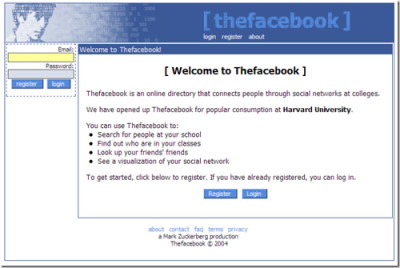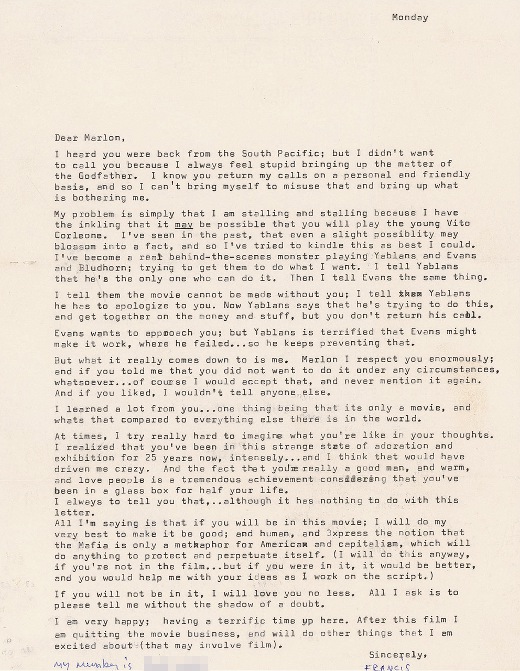Bad Lip Reading makes me laugh every time. Here they take on Michelle Bachmann.
And a music video…
And who can forget their take on Rebecca Black’s Friday…
Bad Lip Reading makes me laugh every time. Here they take on Michelle Bachmann.
And a music video…
And who can forget their take on Rebecca Black’s Friday…
This debate has raged on through the history of St. Eutychus. I maintain that the terms are not synonyms, but highly specific nomenclature to describe two distinctly different subspecies.

From BitRebels.
This is amazing. I’m going to have to post about ten more things so it’s not giving those of you reading on the homepage a motion enduced fit. But wow.

Boing Boing posted this but appear to have deleted the post (also check out the old skool Apple themed design they’re rocking).
There’s a shortcut doing the rounds. You have to be a Facebook developer, which is incredibly easy. And only other developers will be able to see your new profile until they’re made public (you can sign up to get one when they’re made public here).
Facebook Timeline looks impressive. Don’t believe me? Let Don Draper convince you… That video is a mashup of a Mad Men pitch for a Kodak product and details about Facebook’s new profile format. It was created by a guy named Eric Leist.
I’ve got to say – I like these changes and this new design more than I’ve liked anything Facebook has done before, change wise. I’m not one of those people who complains about redesigns. I mean. Look what Facebook looked like when it launched. Navigation is intuitive – and it’s fun looking back through my own story, I’m looking forward to browsing through other peoples’ histories too. That’s what Facebook is for. Right?

Anyway, here are some shots from my sneak peak.
This is a “summary” of photos I was tagged in in September.
And places I visited.
Pretty nifty.
A significant time…
This could be game changing for businesses and churches in terms of creating content with some legacy value, there’s something nice about having an entity’s history there to play around with.
Delicious. And perfect for your next meaty missive.


Love it, designed by Henry Hargreaves, via Dripbook
I like this marketing campaign. It’s Japanese. It’s for Star Wars, for a new boxed set. What a clever use of everyday items…

Some details here.
Steve Jobs died today. That’s sad. I’m probably more shaken by his death than any other celebrity death in my lifetime. It’s final. It means there’ll be no more Steve Jobs creations. He was a brilliant man, an innovator. A game changer. If I had to pick a CEO style hero, it’d be Jobs. What he did with Apple, and with Pixar, is amazing. He leaves a legacy – people love his products, people love his approach to business, everybody has learned a lot about the importance of design in production from him. And his death will rightly dominate internet discussions for the next few days, and you’d expect the business pages of most papers as people speculate…

From the media release:
Statement by Apple’s Board of Directors
CUPERTINO, Calif.–(BUSINESS WIRE)–We are deeply saddened to announce that Steve Jobs passed away today.
Steve’s brilliance, passion and energy were the source of countless innovations that enrich and improve all of our lives. The world is immeasurably better because of Steve.
His greatest love was for his wife, Laurene, and his family. Our hearts go out to them and to all who were touched by his extraordinary gifts.
Many people have commented suggesting Jobs is some sort of Messiah. But unlike Jesus – death is it for Jobs, which was what motivated his success. These words, from a speech Jobs gave to some uni students, are a pretty powerful expression of his worldview now.
“Remembering that I’ll be dead soon is the most important tool I’ve ever encountered to help me make the big choices in life. Because almost everything — all external expectations, all pride, all fear of embarrassment or failure — these things just fall away in the face of death, leaving only what is truly important. Remembering that you are going to die is the best way I know to avoid the trap of thinking you have something to lose. You are already naked. There is no reason not to follow your heart.”
I hope that Steve got to know Jesus in his last few weeks of his life, but this is a stark reminder for all of us that it doesn’t matter how brilliant you are, how much you revolutionise life for millions, death is waiting for all of us. Here are some more words from Steve Jobs from the same speech…
“No one wants to die. Even people who want to go to heaven don’t want to die to get there. And yet death is the destination we all share. No one has ever escaped it. And that is as it should be, because Death is very likely the single best invention of Life. It is Life’s change agent. It clears out the old to make way for the new. Right now the new is you, but someday not too long from now, you will gradually become the old and be cleared away. Sorry to be so dramatic, but it is quite true.
Your time is limited, so don’t waste it living someone else’s life. Don’t be trapped by dogma — which is living with the results of other people’s thinking. Don’t let the noise of others’ opinions drown out your own inner voice. And most important, have the courage to follow your heart and intuition. They somehow already know what you truly want to become. Everything else is secondary.”
This letter from Francis Coppola, director of the amazing Godfather Trilogy, to Marlon Brando, star of Part 1, trying to persuade him to come back for a second round as Vito (the part eventually played by Robert De Niro) is pretty cool.

Cooler, perhaps, is this paragraph…
“All I’m saying is that if you will be in this movie; I will do my very best to make it be good; and human, and express the notion that the Mafia is only a metaphor for America and capitalism, which will do anything to protect and perpetuate itself. (I will do this anyway, if you’re not in the film…but if you were in it, it would be better, and you would help me with your ideas as I work on the script.)”
Did you know that was the metaphor? I just thought the Mafia was a metaphor for depraved human self-interest. But maybe that’s the same thing… I guess then the Corleone family is the “America” in that system, with a refusal to compromise some principles (the Corleones wouldn’t deal drugs), but a willingness to compromise on many others… Thinking through other elements of mafia culture within that metaphor is also a pretty fascinating exercise.
This transcript of a radio piece provides a nice little snapshot of the inner workings of a graphic designer’s mind, when it comes to how they think about their own profession.
Some quotes.
“Graphic design has been likened to a wine glass. When we drink wine we barely notice the glass it’s served in. It wouldn’t be true to say that we don’t care what glass we drink out of — we wouldn’t choose to drink a rare vintage out of a Tupperware mug, for example — but it’s the wine that matters, not the vessel it comes in.”
“For many observers and commentators, graphic design’s embeddedness in commercial culture makes it into one of the specious modern black arts, like spin, hype and branding. And it’s undoubtedly true that most graphic design is about selling things in a consumer society.”
“Most recognise the fundamental difference between artists and designers: artists create work that comes from an inner impulse. Or to put it another way, they write their own briefs. Graphic designers, on the other hand, respond to briefs supplied by others — they are reactive. To go back to our glass of wine — artists supply the wine, graphic designers supply the glass.”
I, for one, appreciate the work of graphic designers. They make it possible to judge an object by its appearance because their work ties an object to a particular culture. And I like that.
I have a little bit of an affinity with the T-Rex, we share the honour of having slightly disproportionate length in our arms. But I probably wouldn’t pay $70 for a T-Rex Skull staple remover.

You might pay that much. Who knows. Apparently there are people out there who’ll pay $1350 for an ornamental elephant paperweight.

You could buy an army of T-Rex staple removers for that price, and face it – they’re slightly more functional than a paperweight.
I’m an Apple fanboy. I don’t know how it happened, but it did. I like iThings. But I’m a little underwhelmed about the new iPhone. Both Robyn and I are off contract, and lugging around a semi-bricked iPhone 3G, and a semi-bricked iPhone 3GS. We’ve been holding off on upgrading to the iPhone 4 believing the hype about an iPhone 5. But where is it?
So now the question – given that our phones barely receive or make calls anymore, and given that we actually do need phones (we don’t have a landline, and the phone provides internet when we’re on the road) – should we stump up the extra for a 4GS? And what provider should we use – we’ve been with Vodathree for ages, and while their customer service is adequate their network is not very good…
I’m not going to go to android – so shut your yaps you insidious open source google nerds… I like iTunes. I like my phone, iPad, and MacBook being essentially tied to the same mothership. But a flashy camera and a slightly faster processor? Seriously Apple. No wonder your share price dipped this morning… What do you reckon?
You can buy this clock, which is a pretty cool fixture if you want to make a hipster friendly cafe, or just be awesome.


Check this out. It’s pretty clear the bottom box is lighter. Right.

Now cover the joint in the middle of the shape with your finger. Do it. On the screen. Amazing.
Via tywkiwdbi
Jason Kottke runs one of the finest examples of the curated link blog out there. He manages to find and post some of the most interesting stuff online before just about any body else. Now, somebody built a robot version of Kottke… it’s an interesting experiment.
I don’t think of St. Eutychus as a link blog. Sometimes it is. Sometimes it’s a content blog. Sometimes it’s a soapbox. But my inclination towards link blogging waxes and wanes. It’s a great way to keep content flowing without investing significant time into posting, but you also get to a point where your curatorial or editorial senses are dulled. There are things on the Internet that don’t excite me as much as they used to. Everybody’s sharing stuff. Some people are sharing everything (I’m looking at you 22 Words)… Kottke describes this malaise beautifully in a piece about the robot version of himself…
“Some days, you just don’t want to do it,” Kottke says. “You look at so much stuff everyday and it all becomes kind of the same—all equally interesting or uninteresting. It’s hard to maintain that sense of discovery, that little hit that you get when you find something that you haven’t seen before. I’ve posted 15,000, maybe 20,000 links since I started. I’ve been whittling down the discovery space of things that are going to be new and interesting.”
Here’s Robottke – the machine version of the link blogger…